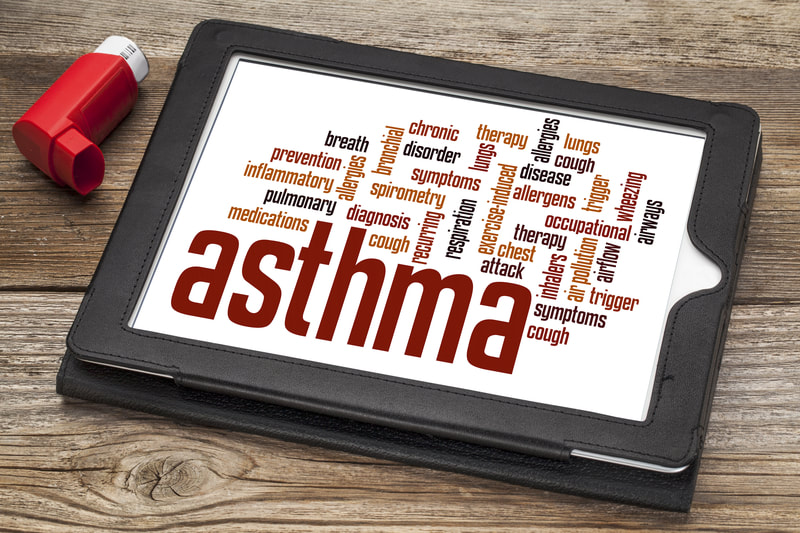|
I’ve had asthma since I was a very young child and there is no greater truth than when you can’t catch your breath, nothing else matters. So what is asthma and how can we counter its impact? Asthma is an allergic disorder characterized by spasms of the bronchial tubes (airways), swelling of the mucous lining in the lungs, and excess mucus production. It’s quite a serious respiratory disease and can cause death. And, it’s scary. Especially when you're a child. My worst asthma attack happened in the early 1980’s when I was about 15 years old at a family reunion on a ranch in the foothills of California. A combination of grasses and dust and who knows what else, had me in the back of our family’s Komfort trailer, struggling for breath for what felt like an eternity. Without any asthma medicine nearby. Each inhale took Herculean effort, and I didn’t know how long I would have the strength to continue. To make things worse, asthmatics know that panic or tears will only make the response worse, so we try very hard to stay calm and focus only on each breath, one at a time. I made it through that day and many other episodes. But, I don't go far without a rescue inhaler at hand.
Today, asthma rates continue to be problematic in the United States, especially among children. In the United States, almost 1 in 10 people have asthma and it was responsible for nearly 4,000 deaths in 2015. Asthma is most common in children under the age of 10, with a 2:1 male to female ratio, which equalizes by age 30. Why is this happening? Well, asthma is a “complex interaction” of environmental and genetic factors, the biggest risk factor is a history of allergies, such as eczema and hay fever. Asthmatics have a tendency to form higher levels of leukotrienes, which are responsible for producing allergic reaction and stimulating bronchial constriction. If the adrenal glands are not producing sufficient levels of cortisol and epinephrine, the stage is set for bronchial constriction. Perhaps it’s our compromised immune system? Today, more and more people are experiencing bigger stressors on their immune systems, from a wide range of sources, including pollution in our air, water and foods, food additives, and genetic manipulation of plants leading to greater allergenic tendencies. Another possible trigger for asthma is the use of antibiotics before the first birthday. A study at the University of British Columbia concluded that infants prescribed antibiotics before their first birthday were more than twice as likely to develop asthma. Multiple courses of antibiotics increased the likelihood 16% for every course of antibiotics. Antibiotics can also contribute to a state of “excess hygiene” which leads to an oversensitive immune system triggering “over the top reactions” to pollen and dust mites. In this case, probiotics may be very helpful, lowering the risk of atopic allergic diseases like asthma and eczema. Another interesting theory is that children with asthma may have a metabolic defect in tryptophan metabolism and reduced serotonin transport. This may be related to Vitamin B6 (pyridoxine) levels and dramatic improvements can be seen with supplementation. Interestingly, common asthma medication can depress prydixoal-5-phosphate levels. In addition, for children, allergic reactions to grains and milk usually show themselves in childhood, just at the time when we are fed the most of these products. Allergy symptoms include earaches, stomachaches, constipation, and asthma, but are often ignored or misdiagnosed. The body then increases endorphin activity around those certain foods to comfort us from this chronic irritation. And guess what, that very same comforting mechanism is why we may find those very same foods utterly irresistible. Another interesting note -- a high sugar diet can cause asthma (which may be yet another reason for asthma’s increasing numbers). Eating too many processed carbs and sugars can cause insulin levels to rise too high, which leads to formation of hormones known as eicosanoids. These eicosanoids function as mediators for relaxing or contracting of various smooth muscle groups, in addition to being involved with immune system responses. If insulin levels are too high, this eicosanoid balance is disrupted, the bronchial smooth muscles contract, the immune response is exaggerated, and the result is asthma. Another important point to consider is the “Respiratory Quotient” (RQ). RQ represents the amount of energy expended by the lungs to rid the body of carbon dioxide generated by metabolism of certain foods. The higher the RQ, the harder the lungs work. In this equation, carbs = 1, fats = .7 and proteins = .9. So, when dealing with asthma, the lungs work harder when processing carbs. What to Avoid…
What to Consider…
COMMON SIGNS AND SYMPTOMS
Other symptoms of allergies...
0 Comments
|
Lorie Gehrke, NCIt's all about our journeys... Here's where you'll hear from me on any number of topics, from nutrition and recipes, to grief and infant/child loss, to parenting and empty nesting, to poetry, dogs, and photos, and all things in between! Archives
October 2020
Categories |

 RSS Feed
RSS Feed
